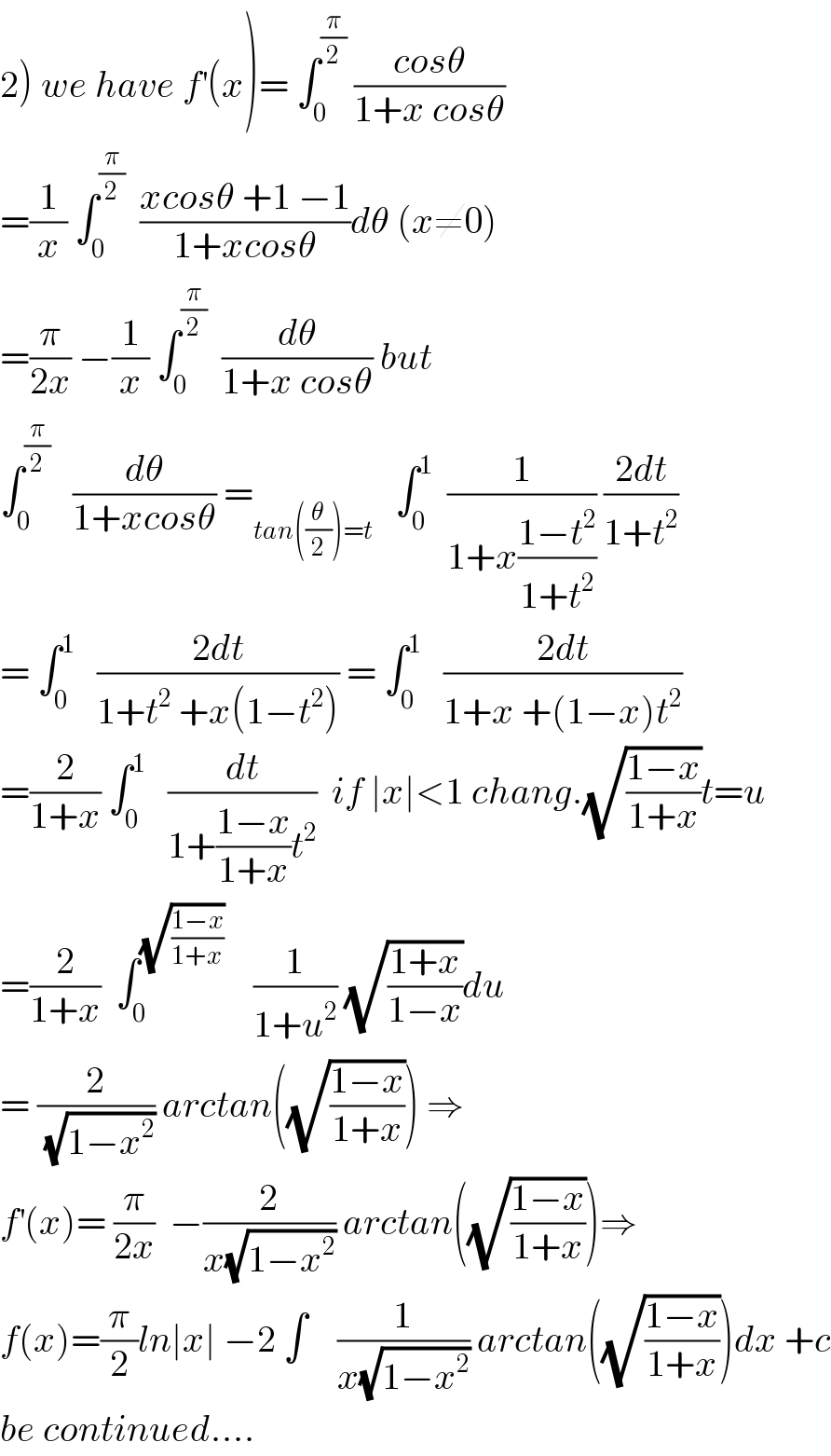
Question and Answers Forum
Question Number 40621 by math khazana by abdo last updated on 25/Jul/18

Answered by math khazana by abdo last updated on 27/Jul/18
![1) f(1)=∫_0 ^(π/2) ln(1+cosθ)dθ = I and let J = ∫_0 ^(π/2) ln(1−cosθ)dθ we have I +J = ∫_0 ^(π/2) ln(1−cos^2 θ)dθ = ∫_0 ^(π/2) ln(sin^2 θ)dθ =2 ∫_0 ^(π/2) ln(sinθ)dθ =2(−(π/2)ln(2))=−πln(2) I −J = ∫_0 ^(π/2) ln(((1+cosθ)/(1−cosθ)))dθ = ∫_0 ^(π/2) ln( ((2cos^2 ((θ/2)))/(2sin^2 ((θ/2)))))dθ = ∫_0 ^(π/2) −2 ln(tan((θ/2)))dθ =−2 ∫_0 ^(π/2) ln(tan((θ/2)))dθ =_((θ/2)=t) −4 ∫_0 ^(π/4) ln(tan(t))dt ∫_0 ^(π/4) ln(tant)dt =_(tant =u) ∫_0 ^1 ln(u) (du/(1+u^2 )) = ∫_0 ^1 ((ln(u))/(1+u^2 )) du =∫_0 ^1 ln(u) Σ_(n=0) ^∞ (−1)^n u^(2n) )du =Σ_(n=0) ^∞ (−1)^n ∫_0 ^1 u^(2n) ln(u)du =Σ_(n=0) ^∞ (−1)^n A_n A_n = [(1/(2n+1)) u^(2n+1) ln(u)]_0 ^1 −∫_0 ^1 (u^(2n) /((2n+1)))du =−(1/((2n+1)^2 )) ⇒ ∫_0 ^(π/4) ln(tant)dt = −Σ_(n=0) ^∞ (((−1)^n )/((2n+1)^2 )) =−λ_0 (the value of λ_0 is known) ⇒ I −J =4 λ_0 ⇒ I +J = −π ln(2) and I −J =4λ_0 ⇒ 2I =−πln(2)+4λ_0 ⇒ I =−(π/2)ln(2) +2λ_0](Q40736.png)
Answered by math khazana by abdo last updated on 27/Jul/18

| ||
Question and Answers Forum | ||
Question Number 40621 by math khazana by abdo last updated on 25/Jul/18 | ||
 | ||
Answered by math khazana by abdo last updated on 27/Jul/18 | ||
![1) f(1)=∫_0 ^(π/2) ln(1+cosθ)dθ = I and let J = ∫_0 ^(π/2) ln(1−cosθ)dθ we have I +J = ∫_0 ^(π/2) ln(1−cos^2 θ)dθ = ∫_0 ^(π/2) ln(sin^2 θ)dθ =2 ∫_0 ^(π/2) ln(sinθ)dθ =2(−(π/2)ln(2))=−πln(2) I −J = ∫_0 ^(π/2) ln(((1+cosθ)/(1−cosθ)))dθ = ∫_0 ^(π/2) ln( ((2cos^2 ((θ/2)))/(2sin^2 ((θ/2)))))dθ = ∫_0 ^(π/2) −2 ln(tan((θ/2)))dθ =−2 ∫_0 ^(π/2) ln(tan((θ/2)))dθ =_((θ/2)=t) −4 ∫_0 ^(π/4) ln(tan(t))dt ∫_0 ^(π/4) ln(tant)dt =_(tant =u) ∫_0 ^1 ln(u) (du/(1+u^2 )) = ∫_0 ^1 ((ln(u))/(1+u^2 )) du =∫_0 ^1 ln(u) Σ_(n=0) ^∞ (−1)^n u^(2n) )du =Σ_(n=0) ^∞ (−1)^n ∫_0 ^1 u^(2n) ln(u)du =Σ_(n=0) ^∞ (−1)^n A_n A_n = [(1/(2n+1)) u^(2n+1) ln(u)]_0 ^1 −∫_0 ^1 (u^(2n) /((2n+1)))du =−(1/((2n+1)^2 )) ⇒ ∫_0 ^(π/4) ln(tant)dt = −Σ_(n=0) ^∞ (((−1)^n )/((2n+1)^2 )) =−λ_0 (the value of λ_0 is known) ⇒ I −J =4 λ_0 ⇒ I +J = −π ln(2) and I −J =4λ_0 ⇒ 2I =−πln(2)+4λ_0 ⇒ I =−(π/2)ln(2) +2λ_0](Q40736.png) | ||
| ||
Answered by math khazana by abdo last updated on 27/Jul/18 | ||
 | ||
| ||